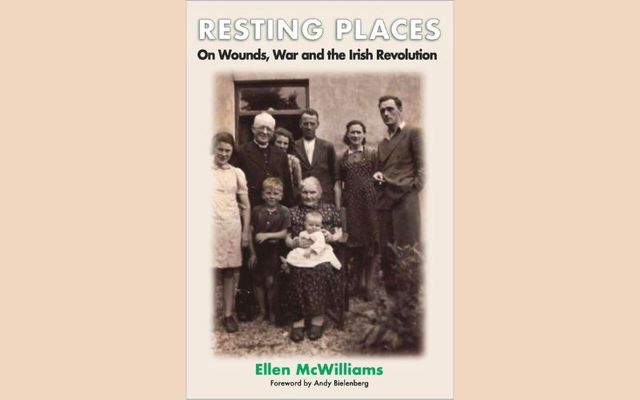The “Decade of Centenaries” in Ireland, which ended recently is a good time to read an excellent and moving book by Ellen McWilliams, "Resting Places: On Wounds, War, and the Irish Revolution."
The book which is part transnational history, part family memoir, explores the violent events of 100 years ago in her native West Cork where she grew up in the 1980s.
"Resting Places" is even more relevant given the Irish Civil War Fatalities Project developed last month by Dr. Andy Bielenberg and University College Cork to investigate the number of people killed during the Civil War.
McWilliams, in dedicating her book to the Protestant families “who lost so much to the Dunmanway Massacre in 1922 and to her mother’s family “who sacrificed so much for Irish independence,” seeks to understand why there was so much brutality and the effect it had on succeeding generations.
With a Faulknerian appreciation that “the past is never dead, it’s not even past,” the author believes we should acknowledge how this violent past haunts the present, in her case her extended family and neighbors caught up in the violence and brutality of the War of Independence and the Civil War.
The renowned Irish war correspondent and broadcaster, Fergal Keane, describes "Resting Places" as “a work of eloquent, haunting beauty, a song of mourning and revelation that deserves the widest possible audience.” Keane continues, “This is a story rooted in a place and time, but it is truly the history of all wars in all times.”
McWilliams exposes the horrific events of 100 years ago, including when the Black and Tans murdered and tortured Irish people in Cork, a county divided between the political extremes of pro-British Orangeism (Bandon was an Orange Order bastion in the early 20th century) and the fierce Republican zeal of Dan Barry and the West Cork IRA Brigade, in which the author’s grandfather’s family were active
The author, a Catholic from a staunch Irish Republican family, is particularly haunted by the murder in April, 1922 of 14 Protestants in Dunmanway, the town where she grew up. These killings, which were denounced at the time by the Sinn Féin Provisional Government in Dublin and the anti-Treaty side which controlled west Cork, probably related to revenge for the killing of an IRA officer, Michael O’Neill, during an armed raid of a Protestant house. However, sectarian hostility was also a factor and led some Protestants to flee to other parts of Ireland or to England.
McWilliams, who teaches Transatlantic Literary Relations, American Literature, and Irish Literature at the University of Exeter in England, is well qualified to understand the conflicting loyalties that beset Irish and British history. Married to an English historian who specializes in the English Civil War, she often wrestles with both academic correctness and British inability to understand Ireland’s separate nationhood.
McWilliams also riffs on her own life and its big and small challenges ranging from combining motherhood with a full-time career, academic chauvinism, and the failure in England to understand Irish history.
Some of the readers of IrishCentral would have known her grand-uncle, Gerry Foley, who like many on the losing side of the Civil War, emigrated to New York City to be employed in the back-breaking work of digging tunnels for the subway system. McWilliams wonders how these men recovered from two Irish wars and survived in exile, although many found friendship and love amidst the very large Irish community in the city.
Gerry Foley became prominent in the IRA Veterans Group in New York and the book features photographs of him in the 1970s marching with the Sean Oglaigh na hEireann contingent in the St Patrick’s Day parade, and another at a meeting with Frank Durkan, the human rights lawyer.

Looking for Irish book recommendations or to meet with others who share your love for Irish literature? Join IrishCentral’s Book Club on Facebook and enjoy our book-loving community.
McWilliams herself spent a year teaching at Fordham University researching the writer, Maeve Brennan, daughter of the Irish revolutionary Robert Brennan (later Irish Ambassador to the United States). Brennan was a celebrated writer at the New Yorker who wrote sketches about New York life in the Talk of the Town section under the pseudonym “The Long-Winded Lady.” McWilliams notes that some of Brennan’s stories “seek justice for the abused Irish working classes in America,” a theme that recurs in the author’s own wanderings in the old Irish neighborhoods of the Bronx and Queens.
The author has written that "Resting Places" is a book about the madness of history and the fear of it, the need to outrun it. “I confess this with some trepidation, even though this book is in all ways honest – honest about the anguish and outrage that drove the writing on – because such honesty carries the risk of being considered strange, eccentric, beyond the pale even,” she states.
In many ways, "Resting Places" echoes the words of the historian Kim Wagner quoted by Martin Doyle in his magisterial book "Dirty Linen," “We are not responsible for the past, but we are responsible for what we choose to remember and what we choose to forget.” This is as true of the events of 100 years ago as it is of those over 30 years ago in what Seamus Heaney called the “man-killing parishes.”
Above all, "Resting Places" is a brave and highly engaging book that provides new insights into the traumatic history of Ireland 100 years ago, while suggesting ways in which we can remember and reconcile those bitter divisions today.




Comments